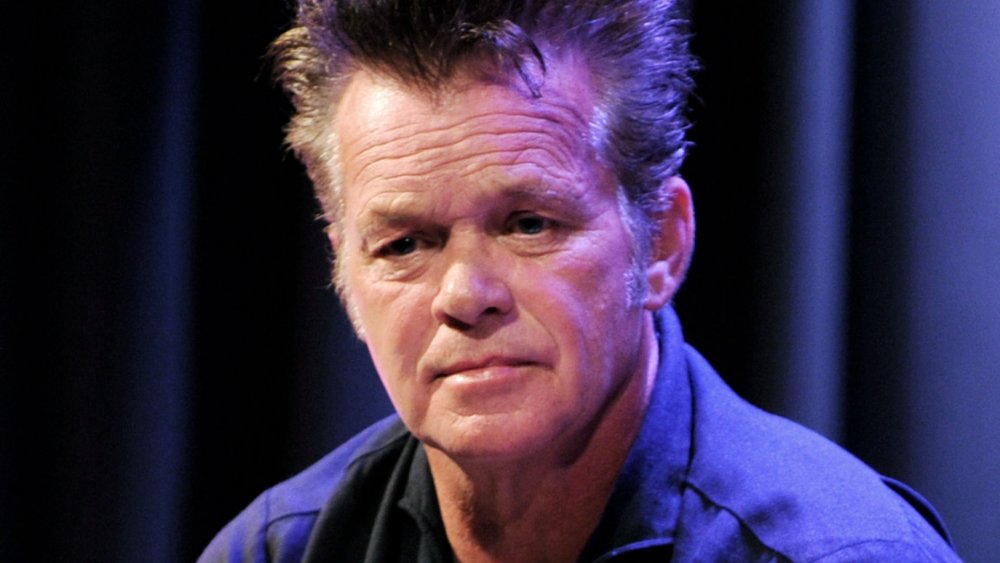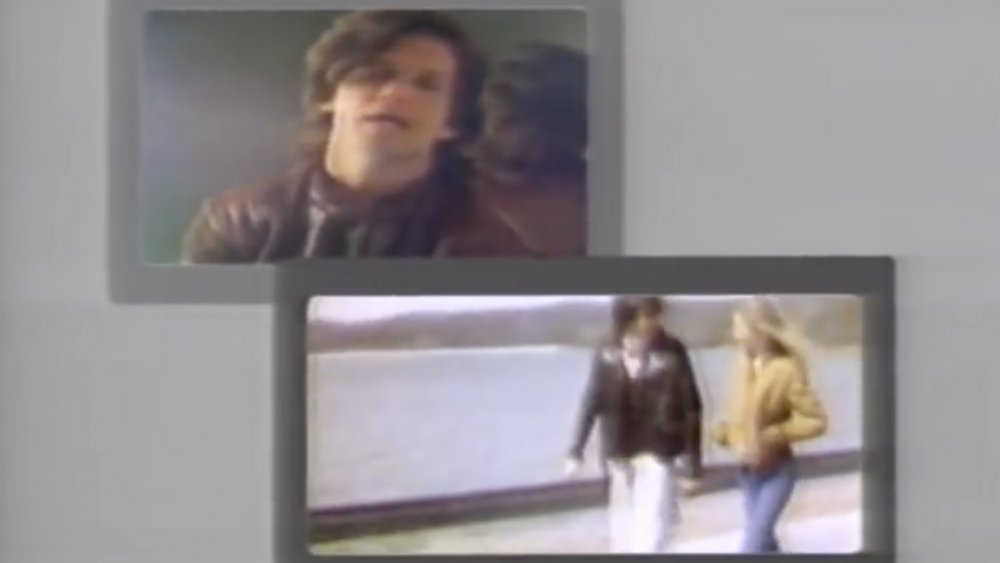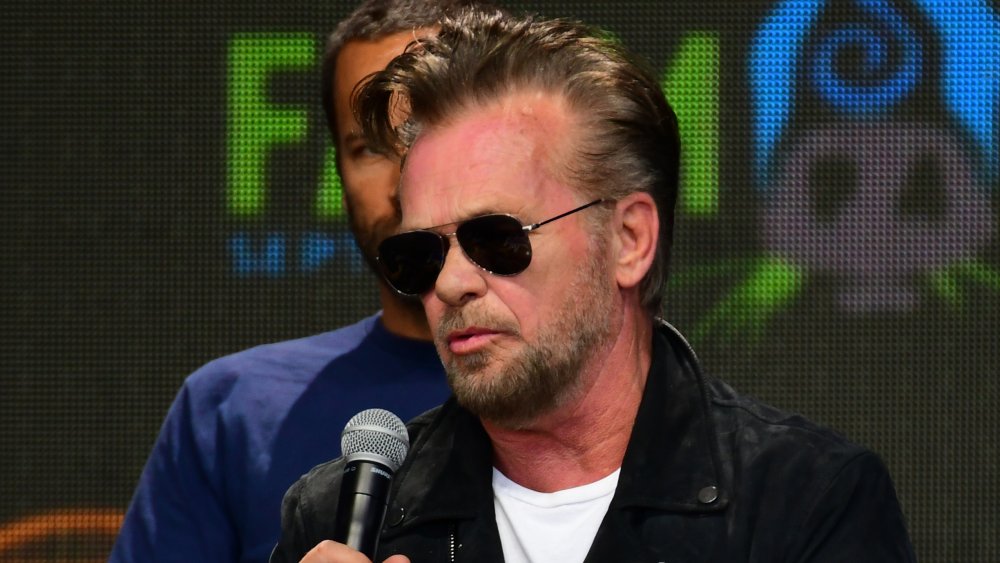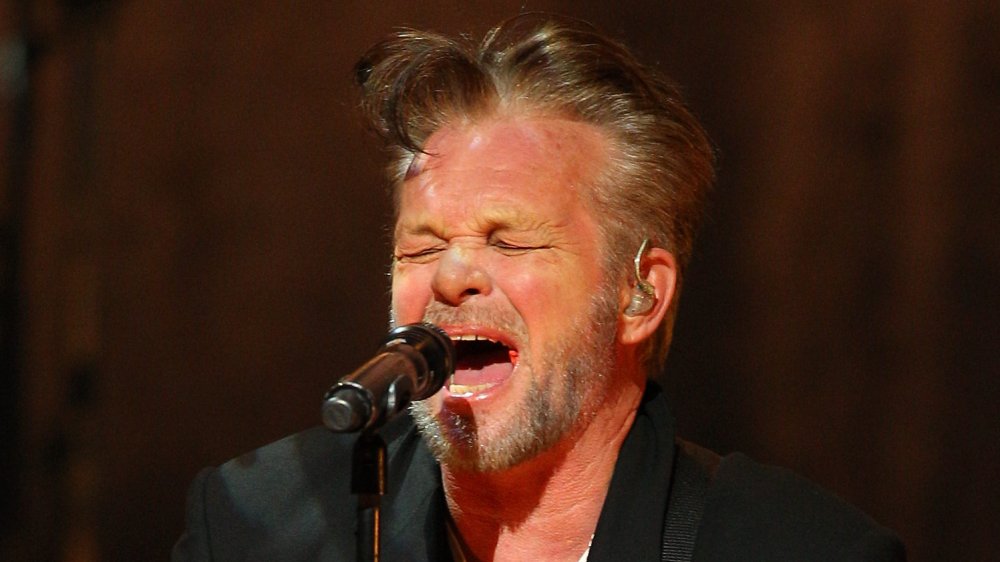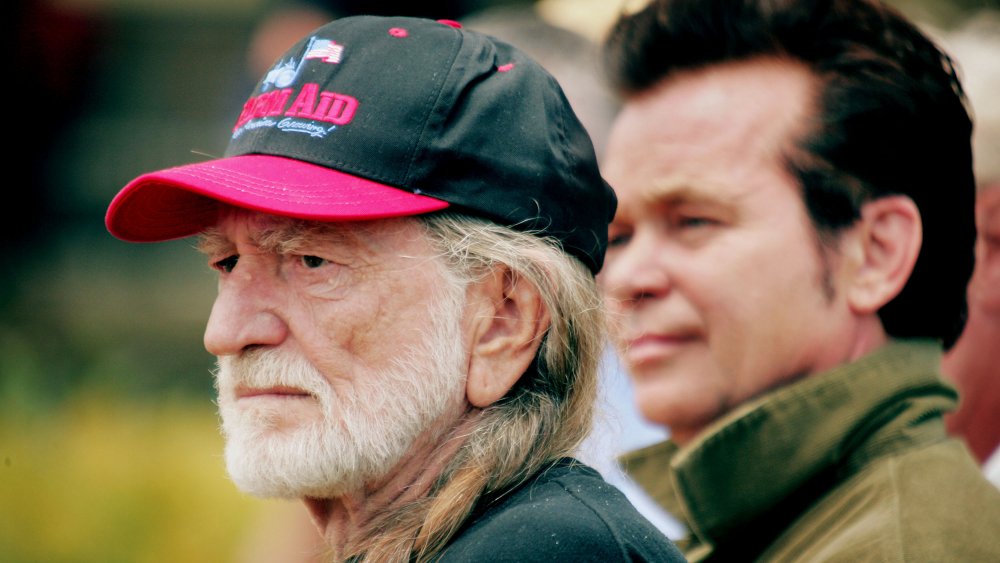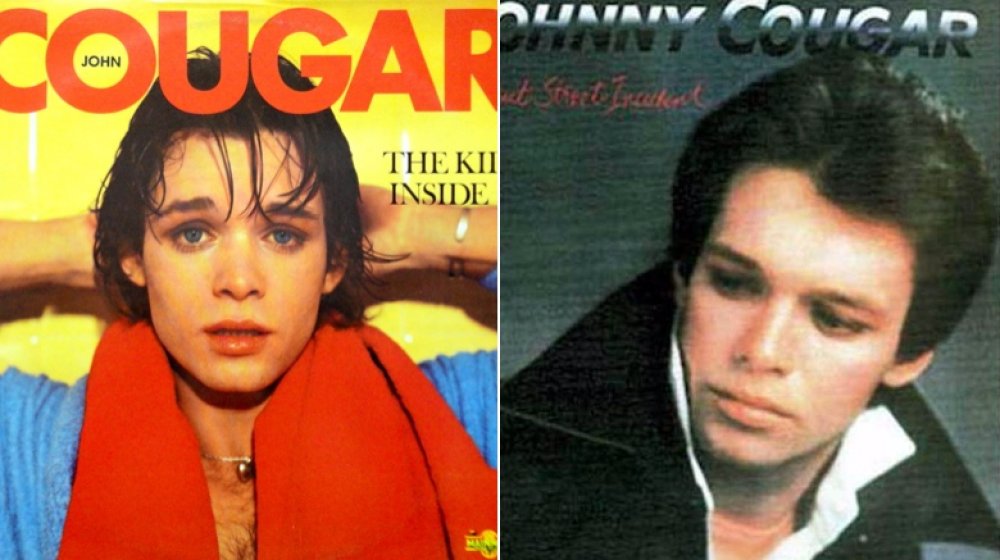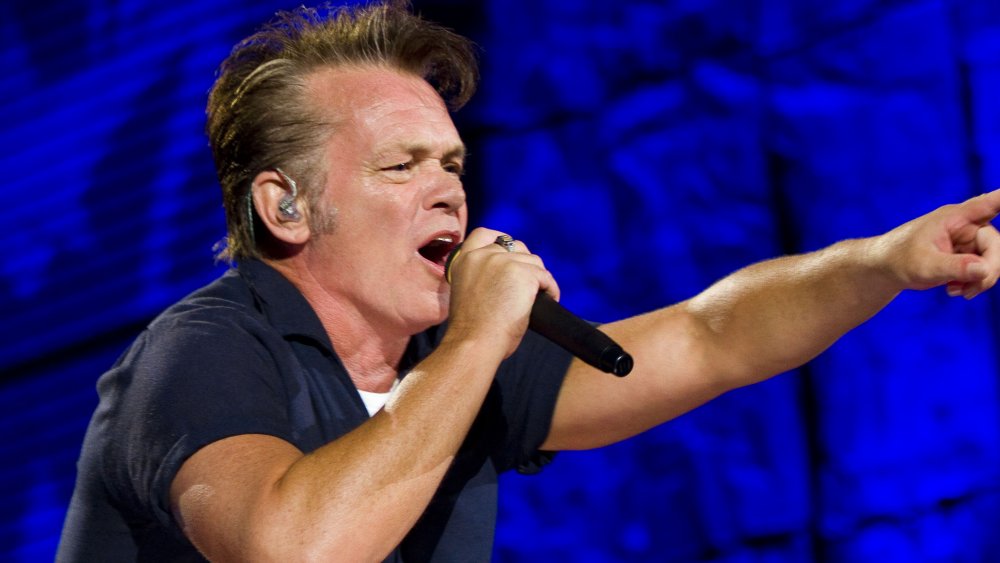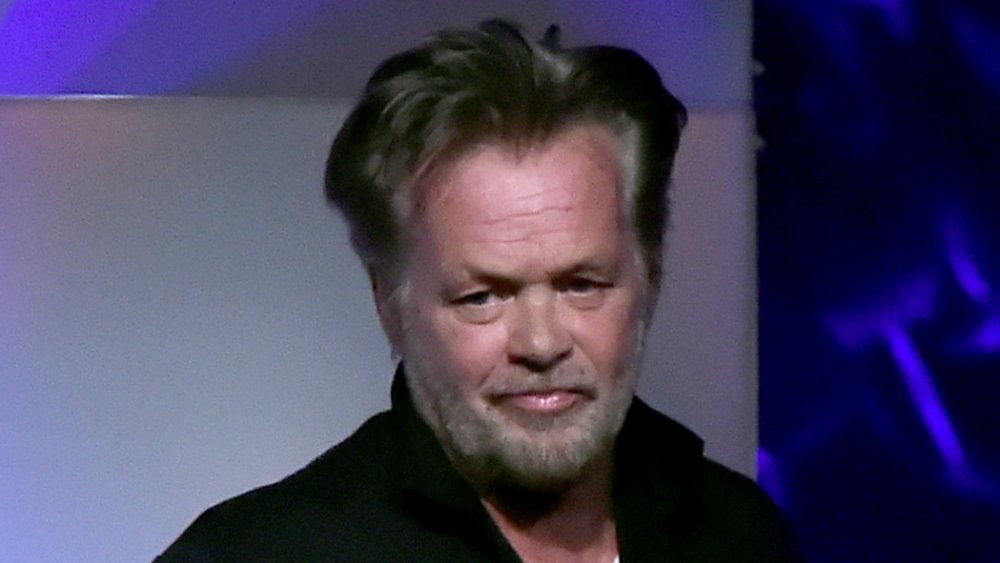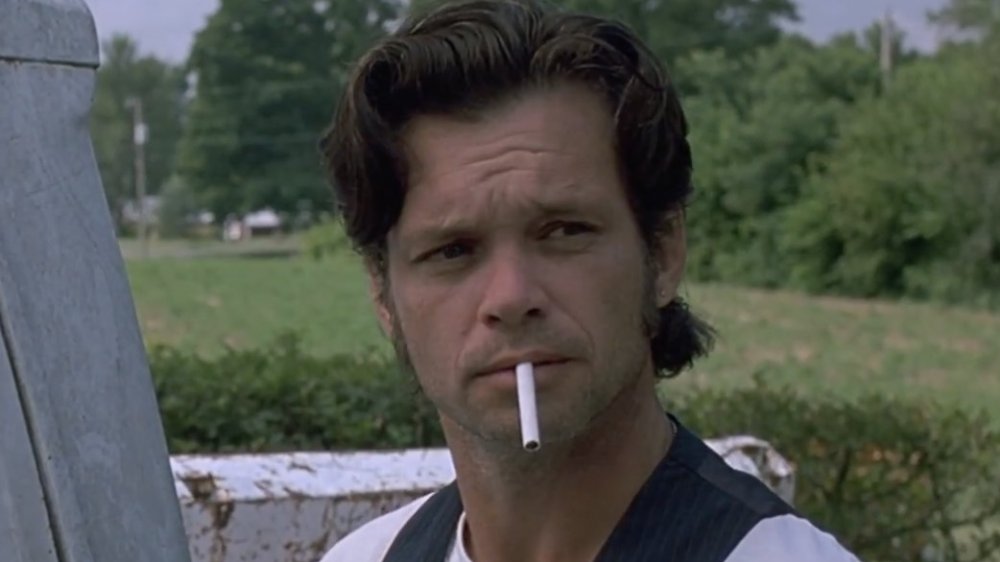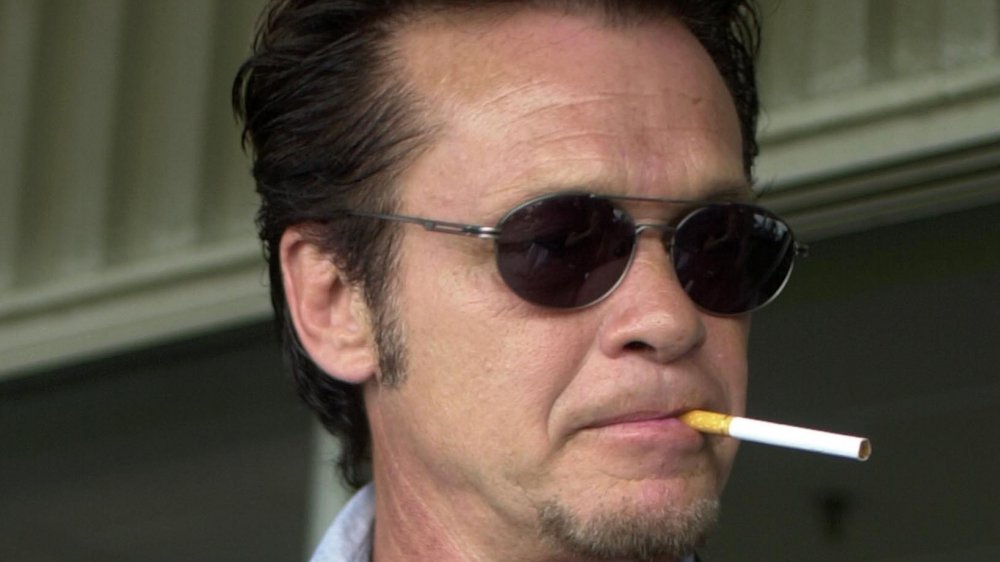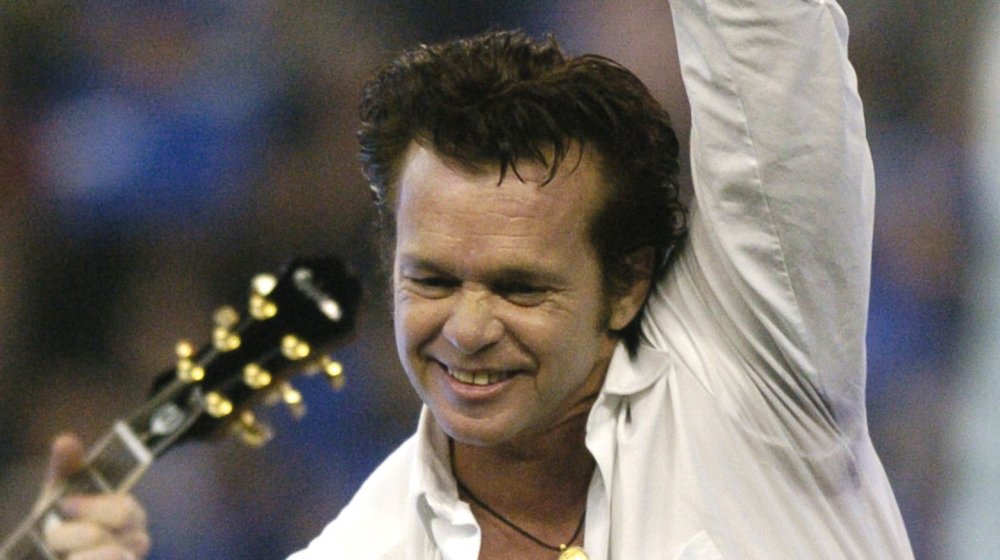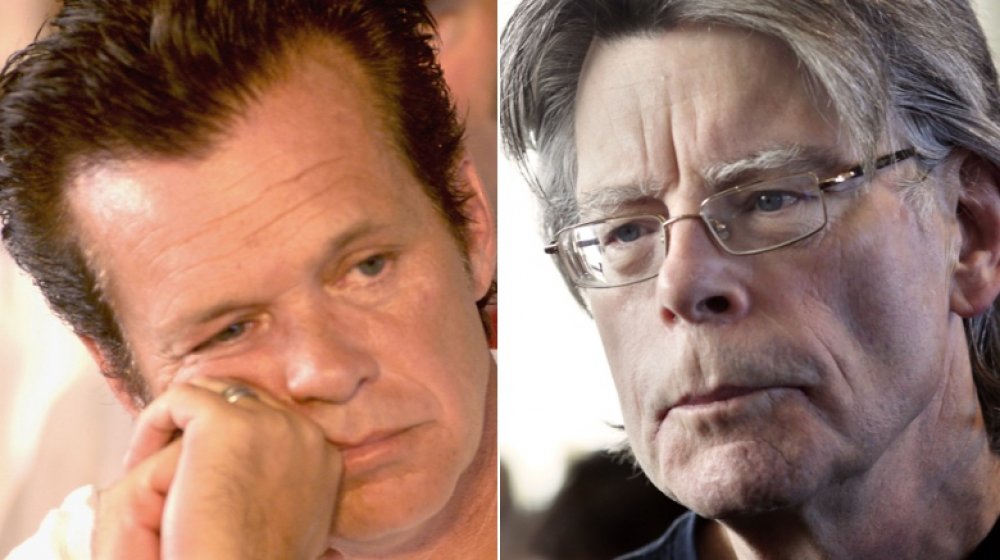The Untold Truth Of John Mellencamp
John Mellencamp, or John Cougar Mellencamp, or John Cougar, depending on how old you are, crafted the soundtrack to American life of the '70s and '80s. Born and raised in Indiana, he made music for real people — alternately labeled as Heartland rock, roots rock, or country-influenced rock — which almost always touched on the plight of the working class, but with hard rocking riffs and creative instrumentation that sound best when coming out of an old car radio. Classic rock stations from coast to coast still spin tons of Mellencamp standards, such as "Jack & Diane," "Hurts So Good," "Cherry Bomb," "Paper on Fire," and "Small Town," to name a few.
The raspy-voiced, rebellious singer-songwriter has been a part of the American cultural fabric for four decades now, and he's lived an epic life filled with triumph and tragedy, art and wild commercial success, false starts and artistic larks. Here's a look into the quirks and tremendous impact of John Mellencamp.
A little story about Jack & Diane
In 1982, John Mellencamp — still going by the John Cougar moniker — scored his first, and so far only, #1 hit with the melancholy young love story song "Jack & Diane." As "Jack" is a nickname for "John," and Mellencamp sings so soulfully about personal issues, fans might assume that the song is about his own experience of being one of "two American kids growing up in the Heartland." But it's not. "'Jack & Diane' was originally about race," Mellencamp told Rolling Stone about how he came up with the song in 1980 while recording in Miami. "I was playing nightclubs and I was seeing new American couples, mixed-race couples. I thought it was cool. The song was my effort to make a song about that."
But Mellencamp's record company did not think it was cool — the song at least. "We had spent $300,000, and I had three songs done," he said. Those songs: "Hurts So Good," "Hand to Hold On To," and "Jack & Diane." The label president flew down to Miami to chew out Mellencamp and his production team for spending so much money on songs he likened to "s***." He ordered Mellencamp to change "Jack & Diane." "He said, 'Maybe if you put some horns on this song and really build the chorus up, then maybe you have a shot. But take the race thing out." Mellencamp heeded only the last part of the advice.
John Mellencamp: portrait of an angry young man
Never quite the glitzy and glamorous ideal of a rock star, John Mellencamp is irascible, says what's on his mind, and occasionally gets grumpy. (He knowingly gave himself his own unflattering nickname: "Little Bast***.") In August 1982, Mellencamp performed for 14,000 fans. Well, actually, he only played about half the set, according to Rolling Stone (via Mellencamp.com), before he came undone. "The guy just snapped. He started into this little preach about how 'the promoter has ripped you off. You've all come to see me,'" said promoter Don Jones. In addition to walking offstage while yelling bad words, Mellencamp threw his drummer's drum kit into the audience, kicked in a monitor (the property of headlining act the Beach Boys). Mellencamp later explained that he was mad that, by his estimates, 12,000 fans had come to see him, not the Beach Boys, and paid $15 (a lot for the time) for his brief, 35-minute set.
That same year, Mellencamp stormed out of an interview for CBS News Nightwatch when he objected to interviewer Felicia Jeter's questions. She pointedly asked him about how he could be anti-establishment when, as a successful pop star, he was the establishment. "I don't go to PTA meetings. I don't go to the Nazarene Church. I don't vote. I don't do any of that stuff," Mellencamp angrily proclaimed, and before long, he was out of there.
John Mellencamp was born in a small town and he hates typewriters
John Mellencamp had one of his biggest hits in 1985 with "Small Town." Succinctly expressing his Scarecrow album's themes of Midwest decay and the death of the American dream, the song hit #6 on the Billboard pop chart and became one of Mellencamp's signature and most familiar tunes. It's a political, emotional song, and it was born out of some anger and self-loathing on the part of the songwriter — Mellencamp himself.
Sometime in the early '80s, his wife at the time, Vicky Granucci bought him an expensive gift to help him with his songwriting process. "I'm the worst speller in the world, so Vicky had ordered an electric typewriter with a built-in spell-check system," Mellencamp told the Wall Street Journal. That's all well and good, but Mellencamp couldn't figure out how to work the device, nor could he make heads or tails with the instruction book. "I'd put a sheet of paper in and start typing, but the words I misspelled weren't being corrected. Frustrated, I said to myself, 'Well, I guess I'm just a stupid hillbilly. What do I know? I was born in a small town.'" While he eventually figured out the typewriter's spell-check protocol, he also realized he'd accidentally inspired himself. "I had my Gibson Dove, so I put the guitar strap around my neck and started playing and typing lyrics," which became "Small Town."
John Mellencamp helped save countless family farms
The massive 1985 Live Aid charity concert — to raise money for African famine relief — featured some of the biggest names in rock, such as Queen, U2, David Bowie, and Elton John performing on stages in Philadelphia and London. John Mellencamp wasn't there — he turned down an offer to perform. "Concerts that just raise money aren't a good idea," Mellencamp quipped, according to Rolling Stone, but he probably spoke too soon. When Bob Dylan performed at Live Aid, he told the crowd, "I hope that some of the money that's raised for the people in Africa, maybe they could just take a little bit of it, maybe, one or two million, to pay the mortgages on some of the farms." Live Aid organizer Bob Geldof labeled Dylan's remarks "crass, stupid, and nationalistic," but Willie Nelson, Neil Young, and Mellencamp thought Dylan had a point.
In September 1985, those musicians held the first Farm Aid concert in Champaign, Illinois. More than 75,000 people witnessed a 14-hour concert (broadcast as a telethon) that included Mellencamp, Dylan, Johnny Cash, and about 50 other acts that raised more than $9 million to assist American farmers in danger of losing their land and businesses. "If nothing else, forget the money," Mellencamp said after the launch of Farm Aid. "We are here for awareness." Over the years, Mellencamp has helped raise both money and awareness of farm issues, as the annual Farm Aid shows have brought in about $57 million.
John Mellencamp's first two recordings hurt so bad
It took John Mellencamp a while to find fame as an authentic rock n' roller. He scored his first top 30 hit in the U.S. with "I Need a Lover" in 1979 at the age of 28, but it's not like he didn't try earlier. Tiring of playing in Indiana bar bands, Mellencamp moved to New York City in 1975 to "make it," and he found favor with Tony DeFries, who'd managed David Bowie ... until they inharmoniously split. DeFries tried to turn Mellencamp into the next Bowie (with a hint of Springsteen thrown in), but also forced him to use the ridiculous stage name of "Johnny Cougar." That's the name on Mellencamp's first album, 1976's Chestnut Street Incident, mostly covers of '50s rock tunes. It sold just 12,000 copies, a number so low that Mellencamp's label, MCA, dropped him and shelved his next album, The Kid Inside.
After that debacle, Mellencamp signed up with Billy Gaff, who managed Rod Stewart and ran Riva Records. Gaff put out the next "Johnny Cougar" record, A Biography, in 1978 which spawned "I Need a Lover." Mellencamp's real career was off and running, although he remained stuck with the "Cougar" for a while, and A Kid Inside would come back to haunt him. After Mellencamp hit #1 with his 1982 album American Fool, DeFries released that forgotten record on his own Mainman Records as a way to cash in on his old client's newfound fame.
John Mellencamp is very political but hates it when politicians use his songs
A lot of John Mellencamp songs mention America by name, but not always in a positive light. Mellencamp explores the meaning of the United States of America and its many disparities and injustices, and that becomes abundantly clear with a closer listen to his lyrics. But some people — politicians, specifically — think that because Mellencamp sings about America then those songs must be extremely praiseworthy and non-critical.
Over the decades, several conservative Republicans running for office have co-opted Mellencamp songs for use on the campaign trail and at rallies, seemingly unaware of their leftist, progressive messages. Mellencamp doesn't like this very much. In 2008, he had his people call John McCain's people to ask them to stop playing the "Our Country" and "Pink Houses" during his presidential campaign events. The former advocates for the Democrat-favored notion of government-funded welfare, while Mellencamp once told Rolling Stone that the latter is "an anti-American song" about how "the American dream had pretty much proven itself as not working anymore." Mellencamp previously had to get Ronald Reagan to stop playing "Pink Houses" during stops on his 1984 re-election tour.
More like John Military-camp, the guy is such a taskmaster
According to his memoir Sex, Drums, Rock 'n' Roll, John Mellencamp's longtime drummer Kenny Aronoff said that his boss built a home studio in Indiana and kept his side musicians "on a retainer so he could call us at any time and ask us to come down to record a song he had just written." A random call to hit the studio for a few hours was nothing like the schedule Mellencamp instituted in the lead-up to the recording of the 1980 album Nothing Matters and What If It Did? According to Aronoff, the band worked on a strict rehearsal schedule: 11 a.m. to 5 p.m., a break of two hours, then more practice from 7 p.m. to 11 p.m., five days a week. For his 1985 album Scarecrow, Mellencamp again gave his musicians a big work load. According to Creem (via Rock's Backpages), he wanted the record to have '60s rock n' roll feel, so he made his musicians study about 100 vintage songs so as to learn them "almost mathematically verbatim."
Mellencamp also tried to control how his band members cut loose. They played football in a regular game Mellencamp called the MFL for "Mellencamp Football League," although Aronoff said the other musicians called it the "Mandatory Football League" because they had to play. While it was intended to be a flag football thing, it descended into "tackle without pads," and Aronoff recounts that band members frequently hurt their "arms, wrists, fingers, ankles, or knees."
John Mellencamp could've been a movie star
As a photogenic guy with millions of fans, Hollywood came calling for John Mellencamp the way it has for so many other well-known musicians, from Elvis Presley to Dolly Parton to LL Cool J. While those musical stars successfully branched out into this other form of entertainment, Mellencamp resisted the lure of pursuing silver-screen stardom. His biggest acting work to date (among about four movies) is his film debut: Falling from Grace. Written by Lonesome Dove author Larry McMurtry and actually directed by Mellencamp himself, this 1992 movie is about a country music star whose life is a mess to heads back to his Indiana hometown to get his head on straight. (Despite the parallels to his real-life, the film is not biographical.) Mellencamp's first film could have come earlier, and might have made him into a star. According to a 2017 interview on The Howard Stern Show, Mellencamp says he turned down the role of hunky J.D. in the 1991 road movie Thelma & Louise. The role instead went to some guy named Brad Pitt.
John Mellencamp's smoking habit caught up with him, and early
According to an interview with CBS News, John Mellencamp gave up drinking when he was in college in the early 1970s, but he kept one vice going: smoking. He took up the habit at the precocious age of 10, and he actually doesn't think 50-plus years of smoke inhalation has been terribly detrimental to his health. "Rightfully or wrongfully, I believe that it's the combination of cigarettes and alcohol that get people — the two of them combined." Mellencamp said.
One of Mellencamp's own experiences contradicts that theory. In 1994, the singer suffered a heart attack at just 42-years-old. "I didn't feel well, I was on tour, and I went back to Bloomington [Indiana], where they have real doctors," Mellencamp said on The Late Show with David Letterman (via Us Weekly). "The guy looked at me and he said, 'You've had a heart attack.' I went nuts... I called him everything in the book... He said, 'John, you can say whatever you want to me or act any way you want, but a first-year medical student can tell you you've had a heart attack.'" Mellencamp didn't quit smoking but he at least cut down a little. In 1999 he told The Georgia Straight (via Ear of Newt) that he'd gone down from four packs a day to just one.
John Mellencamp left his record label over hate speech
With his work on Farm Aid and songs about the working class, it tracks that John Mellencamp doesn't care much for injustice or intolerance. And after building up a long career and selling millions of albums, he has enough clout in the music industry to call it out when sees that kind of behavior go down. In 2001, Mellencamp released the single "Peaceful World," a duet recorded with India.Arie. That song appeared on his Columbia Records album Cuttin' Heads, of which the title track found Mellencamp performing with Public Enemy rapper Chuck D. Seven years earlier, the singer had one of the biggest hits of his career with "Wild Night," a duet with Meshell Ndegeocello. What do those Mellencamp collaborators have in common? They're African-American, and a Columbia Records executive had a problem with that. "My manager went in and was talking to the record company, and the president of the record company — who I won't mention his name, but you could probably figure it out — said, 'I don't know why Mellencamp insists on having these [extremely gross and offensive word] singing with him," Mellencamp said on The Howard Stern Show in 2017 (via Ultimate Classic Rock).
Pointing out that Columbia had a deep roster of African-American hip-hop acts at the time, Mellencamp told Stern that as soon as he heard about the executives' remarks, "My next call was to [his lawyer] Allen Grubman, and I just said 'Get me off this label — now.'" Mellencamp recorded the 2003 covers collection Trouble No More and thereupon left Columbia Records forever.
John Mellencamp: The Musical!
When one thinks of the American musical theater, the names of duos like "Rodgers and Hammerstein" and "Kander and Ebb" come to mind... but probably not "John Mellencamp and Stephen King." Amazingly, America's greatest roots rocker and America's pre-eminent horror novelist collaborated on a theatrical spectacular. According to a press release for the musical (Mellencamp wrote the music and King wrote the script), Ghost Brothers of Darkland County is a "southern gothic supernatural" show about two brothers who don't get along forced by their father to hang out in a haunted house, where they're visited by the ghosts of two dead brothers who also hate each other. (So, you know, that old thing again.)
The initial production, presented in Atlanta in 2012, featured lots of stage blood, and in 2014, the show toured major North American cities with a cast led by Billy Burke (the dad from Twilight) and Gina Gershon (Showgirls). Ghost Brothers took an uncharacteristically long time to gestate. While King publishes well over a book a year on average, and Mellencamp is good for an album about every two years, it took the pair over a decade to develop this creepy, kooky, scary musical.
